Neighbor Laolu Senbanjo On Being Nigerian In America, His Art Exhibit & Concert At Bar Chord Tomorrow And More
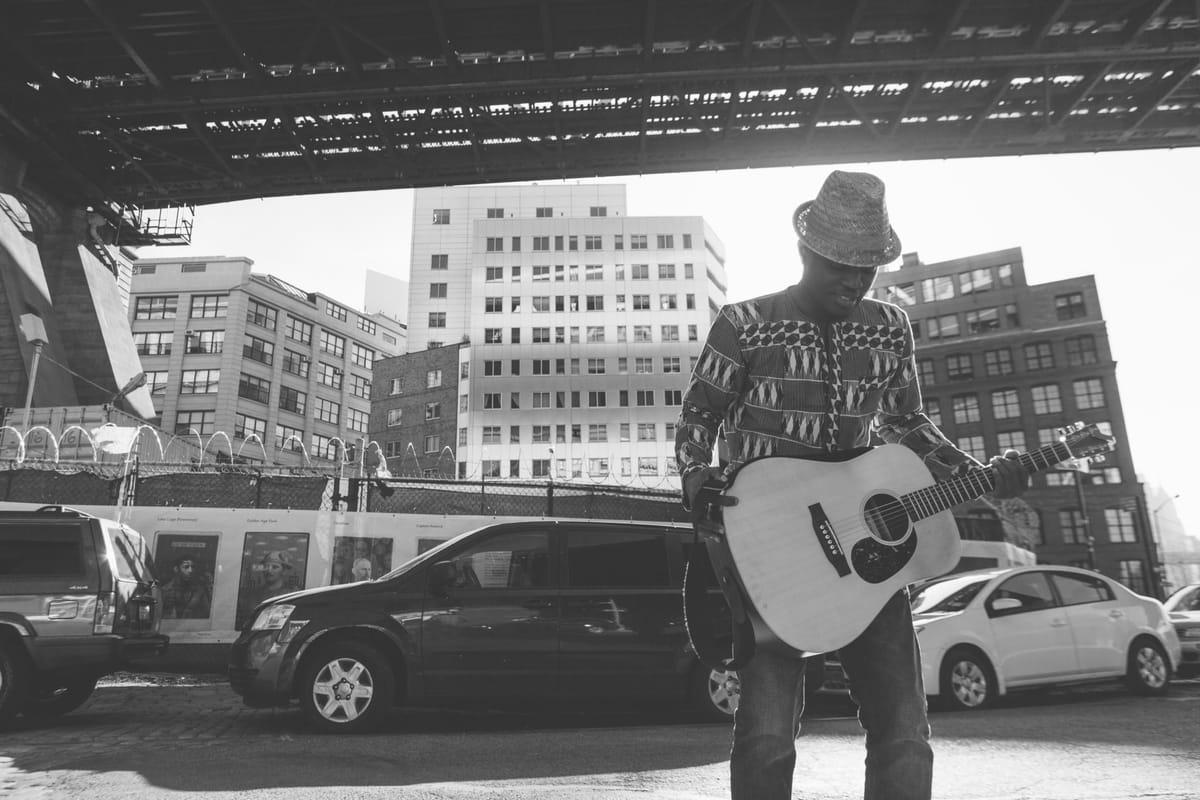
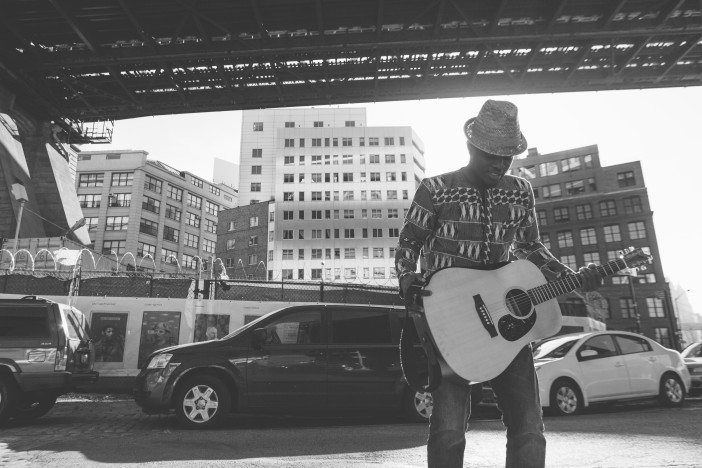
Laolu Senbanjo was born and raised in Ilorin, Nigeria, became a human rights lawyer in his home country, and is now a full-time artist living with his family in Ditmas Park. A visual artist and musician whose work is heavily inspired by his Yoruba heritage, Laolu delves into everything from social justice to feminism in his work, which he has coined “Afromysterics,” a term that he describes as “the mystery of the African thought pattern.”
Laolu is always involved in about a million different artistic endeavors — he’s about to go on a book tour in Nigeria, he’s part of photographer Ima Mfon’s “Nigerian Identity” exhibit at the Klompching Gallery in Dumbo (which was just covered by CNN), and he’s starring in a new web series, “Assorted Meat,” just to name a few of his projects.
In our neighborhood, Laolu will launch a new art exhibit, as well as perform his music, at Bar Chord (1008 Cortelyou Road, by Coney Island Avenue) tomorrow, Friday,August 14. The show will begin at 9pm (though you’re invited to hang out with Laolu in the bar’s garden beforehand), and his art will be shown at the bar for several weeks.
Before his show, we wanted to touch base with Laolu to learn about his upcoming exhibit and show, his art and more.
What inspired you to become a part of Ima Mfon’s project/how did you first connect with the photographer?
Ima and I first met last year in October during the Photo Plus Expo at the Jacob Javitz Center in the City. I was working for Nikon creating live art for the entire expo so the photographers could test out the latest cameras. I was the subject matter. He asked me about what I was painting; I told him, and he asked my name. We then both realized we were both Nigerians. We had an instant connection and shared our information. Later on that month he came over to eat a Nigerian meal prepared by my American wife and discuss the project with us. As an artist I am always interested in collaborating and working with other artists. I was thrilled when he asked to photograph me.
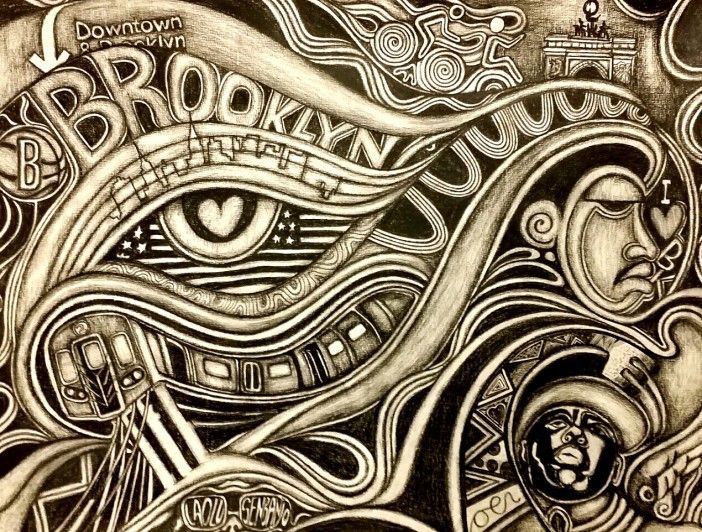
For you, what does it mean to be Nigerian in America? Is there a difference between being Nigerian in America, as compared to being Nigerian in Brooklyn?
For me, being Nigerian in America usually means being Black in America, and I’m not Black; I’m African — in particular I’m Yoruba. I come from a very very rich culture that is rooted deep within me. For me as an artist, my culture is practically everything to me. The symbols I use and draw, the words I sing (often in Yoruba), the proverbs I draw, sing or interpret with, the gods and goddesses, everything is all from my culture. So often when someone sees me, and they see me as a Black man, it’s hard because they aren’t really seeing me; they are just seeing an exterior and that can be frustrating. But that doesn’t mean that social justice issues aren’t important to me. They are incredibly important to me because before doing art full time, I was a human rights lawyer in Nigeria. So I definitely believe in fighting for equality among all.
Moving to the states made me more grow as a person because when you move to another culture, you have to adapt to everything: the food, the language/idioms, the customs, and you have to assimilate. Navigating through cultures is a very interesting experience. Because I am an artist I get to share a bit of myself with others on a daily basis. Naturally people ask where I am from upon meeting me so that always leads to me talking about myself, and I’m usually creating either in a public space or on my front porch.
Brooklyn definitely makes the transition easier than other places in America because I have access to things I miss, like my food. Almost all Chinese restaurants have fried plantain, which is a side dish with chicken and jollof rice (a staple food). There’s a Nigerian grocery store on Flatbush, around the corner from Dorchester called Wazobia, and there’s a Ghanaian grocery store on Cortelyou Road called Gold Coast, so I can get a lot of my staple foods there, and a lot of the grocery stores even carry several common Nigerian foods. Also, there’s even a church on Cortelyou Road that has a Yoruba speaking service on Sundays. There are a few Nigerian restaurants in Brooklyn, and there are many Nigerians here, more than I expected. I meet Nigerians almost everywhere I go. So being Nigerian in Brooklyn is much easier than other parts of America, plus there are a ton of Africans, but being Black in Brooklyn I wouldn’t say is easy and that’s a whole ‘nother issue in itself.
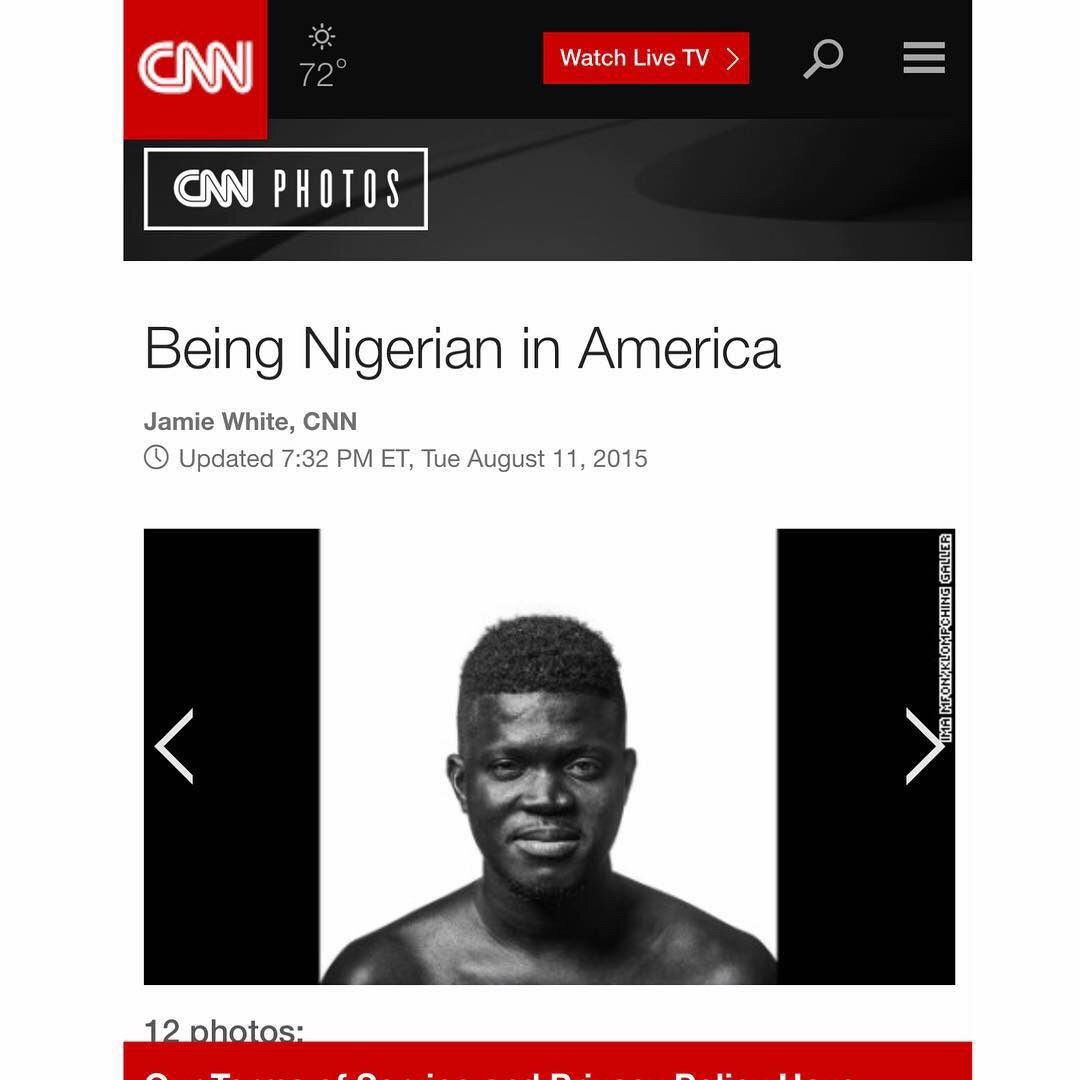
Is there a Nigerian community in Brooklyn/the city that you spend time with?
Yes, I’ve made a circle of Nigerian friends that have moved to Brooklyn from Nigeria or other parts of the world. It’s nice to get together with them and be able to speak in our native tongue. I often have the opportunity to do this when we are filming the web series I am part of, “Assorted Meat,” because my cast mates are all Nigerians living in Brooklyn. (You can watch the show below or here.)
There are a lot of African events in Brooklyn, and in the city, where I meet a lot of Nigerians at as well. It’s nice being able to have people to relate to on a different level.
You split your time between Nigeria and Brooklyn, right? How often do you go back and forth? What do you miss most about Nigeria when you’re here?
I haven’t been back for a while at the moment, but I’ll be going back in December for a book tour. I am working on a graphic novel with a Nigerian author, and we’ll be doing a book tour there. I miss the warm weather; winter is hard for me. I miss my family and friends and my gallery, and, of course, I miss certain foods. But I really like New York. There’s nothing quite like it. It really is the center of the universe and for me everything is here, especially Ditmas Park. We have diversity, quiet green streets, real houses, and we’re in the heart of Brooklyn. I love Ditmas Park.
Many people will talk about the isolation that can come from being an immigrant — what has your experience been like with that? What will you do to reconnect yourself with the people/places you’re missing when you’re so far away?
Well, there are hard days where I feel like I’m a bit isolated, but generally I am blessed with my family here. They are here for me and try really hard to make me not miss home and try and do things like cook me my favorite food, and we listen to Nigerian music. But, like I said, there are many Nigerians here and I have a lot of African friends. Plus, I am able to do what I love here which isn’t as easy back home. I am a full-time artist and surviving in New York — that in itself is more than I could ask for.
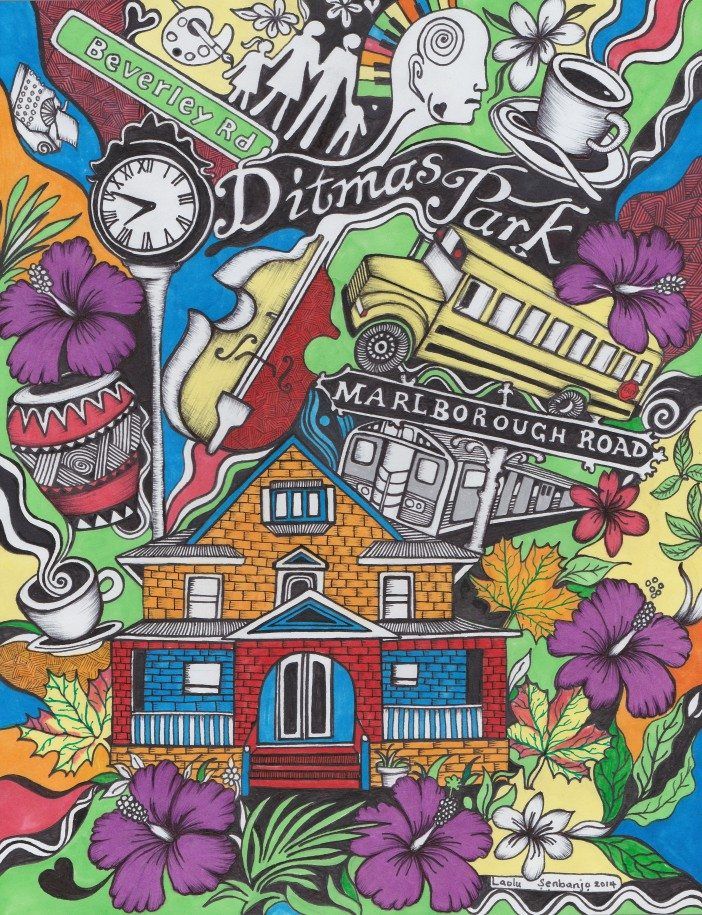
How does Nigeria and Brooklyn/Ditmas Park inspire your work?
Well, my culture is at the heart of my work, always has been and it’s incredibly evident. But I do a lot of Brooklyn-related works and even have a Ditmas Park work. The postcards are for sale at the Brooklyn ARTery. People all over the world really connect to Brooklyn, and I’ve found that people like my Brooklyn works. I have a whole series of Brooklyn works that have elements of the different communities in it. Nigeria is always somehow represented in my work, whether it be the African map, different symbols that represent African culture, or other such things.
Also, Ditmas Park is a lovely vibrant community of artists and we always encourage one another. My group that I am part of, Flatbush Artists, is incredibly supportive. I have made some great friends and connections through the group that’s been helpful. Also, this neighborhood is really great for my daughter, and that makes life a bit easier for me. It’s easier when you have a good place to raise your kid. When she’s happy, we’re happy.
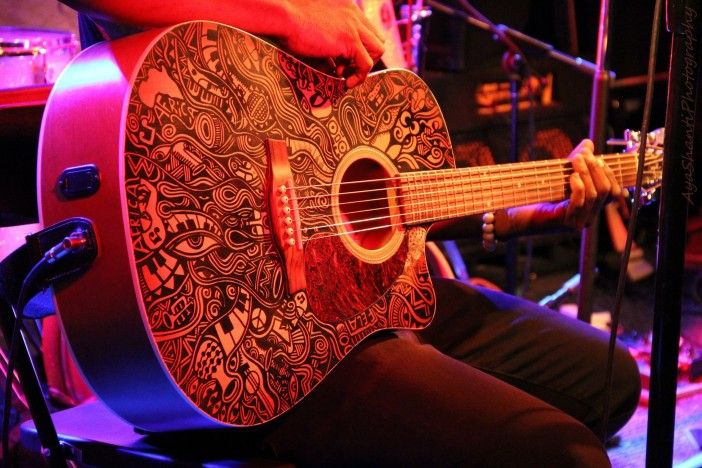
Speaking of your work, tell us about the art exhibit and music show you have coming up at Bar Chord!
This Friday’s exhibition is going to be a special one. In the past year I began to diversify my art and started to create on any surface available to me and tell the story of those objects. So, this Friday, I will be exhibiting a new series with art on guitars. My style of art is always a visual narrative, telling a story through my eyes. So I’ll have my guitars on display at Bar Chord; the best thing is, if you buy one, you not only own an original artwork by Laolu Senbanjo but you also will own a guitar to make music on.
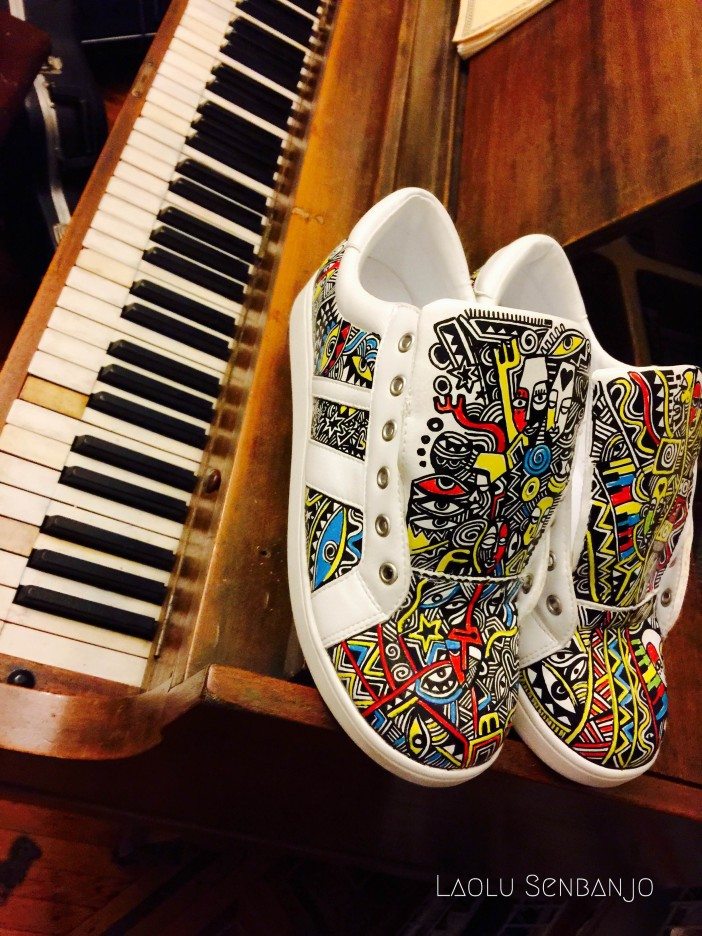
Also, I’ve been creating hand drawn customized shoes for people, and I will have samples of those along with me. The shoes are actually quite special because the tell the story of the owner and they also have a Yoruba proverb that represents the beliefs and ideals of the individual that owns the shoes. The reason I use Yoruba proverbs is because I am a proud Yoruba man. I plan on using these shoes in an exhibition and the new series is called, “Step into my Sole.”
The show is this Friday at 9pm, but feel free to come have a drink early in the garden, where I’ll definitely be working on a pair of my shoes. The show is titled: Laolu: A man and his guitars. So this show is going to be about the guitars as an art form in all senses. I’ll be exhibiting my guitar art and being playing an acoustic set showcasing the beauty of the sounds of the guitars.
What are you hoping neighbors will take away from the show/exhibit?
As always, hopefully they will enjoy the art and music, take a piece of my culture with them and hopefully they make some new friends and have a good time.
Is there anything else you’d want people to know?
I am a proud Ditmas Park resident, love to get to know my neighbors and love to create art, in all forms. I love doing murals; I’m always looking for wall space, whether it’s on the outside of a building or a wall in a home or business. Also, I would love to draw/paint on a car, especially a Fiat or Mini Cooper if anyone is willing! I’m also collecting used or broken guitars to continue my guitar series! People can contact me and come check out my stuff in person, and I also give lessons.
To learn more about Laolu, you can see his latest work on Instagram or his website, listen to his music here, and watch his music videos here.




